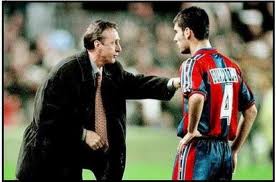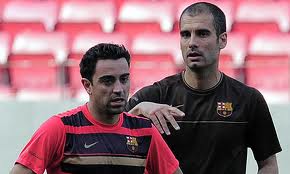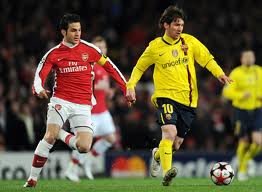The marquee matchup of the Round of 16 is without a doubt Arsenal vs. Barcelona. That’s partly because Arsenal is the one group-stage favorite that slipped into 2nd place in their group (behind Shakhtar Donetsk, due to losses at Donetsk and at Sporting Braga), and hence had to draw a group winner for the Round of 16. But it’s also because these teams have an affinity, a rivalry, and a history.
Their rivalry comes out of their affinity and their history. Both play what might be called the Dutch style of football–one that emphasizes possession, with the ball on the ground, intricate and sustained buildup (the opposite of “Route one” football), one- and two-touch passing (tiki-taka, if you will), individual technical skill, movement off the ball, a fearful geometry of passing angles..all in all, various aspects of “total” football.
Indeed, this Dutch heritage is real, especially in Barcelona’s case: their spiritual leader is Johan Cryuff, who brought to Barcelona this style–or rather philosophy–from Ajax in the early ’70s, when he was the best player in the world. It was Cryuff who suggested that Barcelona set up a youth academy, similar to the Ajax Academy, which became the famous La Masia–“The House that Built Barca” (h/t to Sumit for the link).

And Cryuff returned to Barcelona in the early ’90s, managing a group of fantastic players called Cryuff’s Dream Team–the “fulcrum” of which was a young midfielder named Pep Guardiola. Now of course Guardiola is manager–and some are saying Guardiola’s current team is better than those Barcelona teams; including some who played alongside Pep back then (“when they won the European Cup for the first time in 1992 and clinched four consecutive league titles between 1991 and 1994. That side featured the likes of Romario, Hristo Stoichkov and Ronald Koeman.)
Cryuff now dispenses his opinions and wisdom with weekly essays that appear in the Barcelona newspaper El Periódico. One of his recent entries was titled “El fútbol total del siglo XXI“–“Total Football for the 21st Century” (“Solo dos equipos, el Madrid de Di Stéfano y el Ajax de los años 70, habían sido capaces hasta ahora de reinventar el fútbol como lo está haciendo el de Guardiola” which translates to: “Only two teams, the Madrid of de Di Stefano and the Ajax of the early ’70s were able to reinvent the game as Guardiola’s team is now doing.”
With Arsenal, a similar “continental” style of play came to north London via France–Arsene Wenger arrived to manage Arsenal in the mid-’90s, after a decade managing in France. Although he’s perhaps best known for bringing to the Premier League French and African (and especially, perhaps, French-African), two of his most influential players in his first decade coaching at Arsenal were Dutch internationals Denis Bergkamps and Marc Overmars–and one of his most important right now is Dutch striker Robin van Persie.
But his most important player, Arsenal’s talisman, if you will, is Cesc Fabregas–a native Catalan whom Wenger signed away from Barcelona’s La Masia seven years ago, when Cesc was only 16. Apparently Cesc was convinced that he wouldn’t have the same opportunities to play at Barcelona that he has had at Arsenal, given the midfield talent that was being groomed at La Masia back then. But now Barcelona now wants to bring Fabregas back–which is one source of conflict between the clubs, and one of the major storylines of these meetings.
Consider this anecdote related in a BBC piece titled “The One That Got Away“:
As a player, Guardiola was very much the prototype of the modern Spanish midfielder: technically-gifted, balanced and an immaculate passer of the ball.
He was at the heart of Johan Cruyff’s all-conquering Barca side in the 1990s and was idolised by the young Fabregas as he made his way through the academy ranks.
Borrell, who has remained a friend and confidante to Fabregas, tells a story that encapsulates the connection between the Arsenal star and his one-time hero.
In 2001, when Fabregas was going through the pain of his parents’ divorce, Borrell persuaded Guardiola to sign his famous number four shirt for the young protege. On it, he wrote: ‘One day, you will be the number four of Barcelona.’

But for now, of course, the heart of the Barcelona midfield, the deus ex machina, is Xavi. Messi scores the goals, gets the press, gets the awards–but many thought it was Xavi that should have received the Balon d’Or this year, instead of Messi (but Xavi finished 3rd in the balloting–with Iniesta finishing 2nd!).
You must read this interview with Xavi that Guardian Football’s Spanish correspondent Sid Lowe conducted last weekend. An excerpt:
Think quickly, look for spaces. That’s what I do: look for spaces. All day. I’m always looking. All day, all day. [Xavi starts gesturing as if he is looking around, swinging his head]. Here? No. There? No. People who haven’t played don’t always realise how hard that is. Space, space, space. It’s like being on the PlayStation. I think shit, the defender’s here, play it there. I see the space and pass. That’s what I do.
That’s at the heart of the Barcelona model and runs all the way through the club, doesn’t it? When you beat Madrid, eight of the starting XI were youth-team products and all three finalists in this year’s Ballon d’Or were too – Lionel Messi, Andrés Iniesta and you.
Some youth academies worry about winning, we worry about education. You see a kid who lifts his head up, who plays the pass first time, pum, and you think, ‘Yep, he’ll do.’ Bring him in, coach him. Our model was imposed by [Johan] Cruyff; it’s an Ajax model. It’s all about rondos [piggy in the middle]. Rondo, rondo, rondo. Every. Single. Day. It’s the best exercise there is. You learn responsibility and not to lose the ball. If you lose the ball, you go in the middle. Pum-pum-pum-pum, always one touch. If you go in the middle, it’s humiliating, the rest applaud and laugh at you.
Your Barcelona team-mate Dani Alves said that you don’t play to the run, you make the run by obliging team-mates to move into certain areas. “Xavi,” he said, “plays in the future.”
They make it easy. My football is passing but, wow, if I have Dani, Iniesta, Pedro, [David] Villa … there are so many options. Sometimes, I even think to myself: man, so-and-so is going to get annoyed because I’ve played three passes and haven’t given him the ball yet. I’d better give the next one to Dani because he’s gone up the wing three times. When Leo [Messi] doesn’t get involved, it’s like he gets annoyed … and the next pass is for him.
See below for what Xavi has to say about Arsenal and English football. (With apologies to Sid Lowe and the Guardian, we’ve ended up excerpting the majority of the interview–so click thru and give them a pageview. Or even better, make sure you read everything Sid Lowe writes–no better English-language coverage of La Liga exists, as far as we can tell. In fact, click thru to Lowe’s breakdown of “Three lessons for Arsenal before they take on Barcelona“; namely–1: Internazionale, Champions League, 20 Apr 2010; 2: Sporting Gijón, La Liga 12 Feb 2010; 3: Real Madrid, La Liga 29 Nov 2010.)

